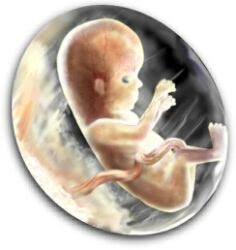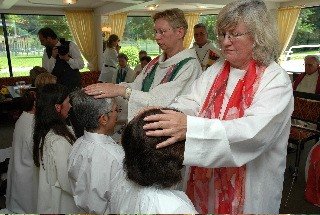Contraception and Abortion (post #3)
RESPECT LIFE
This is the third of three posts in response to Aus Blog who commented on my post on pro-life resources. (Though, I also would like to post a summary of Hummanae Vitae a bit later).
Aus Blog has a blog entitled simply "Abortion." On this blog, Aus Blog has one post entitled "An Atheist's View on Abortion":
http://abortion-whats-your-oppinion.blogspot.com
/2006/11/atheists-view-on-abortion.html#links
Aus Blog is an avowed atheist, but he/she believes abortion is immoral in 98% of the cases (when it is used only as a form of contraception vs. the 2% of times that it is used in the case of rape, incest, or for health condition of the mother).
I read the post and would like to make some comments.
Aus Blog (comments in green) states: "I am a 98% pro-lifer, 2% Pro-choicer, who has no religious convictions at all. I didn't need the fear of god or anything else to come to my decision, just good sense of what is right and wrong."
This statement is interesting on a couple of levels. I also do not believe that one needs to be a Christian or even a believer in God to see the immorality of abortion. However, it is always curious to me what atheists cite as their source of "right and wrong." My source of morality is natural law (known through my conscience) which is aided by divine revelation (which reached its highpoint in Jesus Christ and His Church). I am not sure what atheists hang their hat on (if there is no God... where does such abstract concepts of "right and wrong" come from?). Still, I am glad that Aus Blog is an atheist who believes in ethics and morality. Atheists who forego ethics and morality can be far more dangerous than "religious extremists" (I refer to the bloody reign of the communists).
Aus Blog displays some sound logic as to why all people (be they religious or not) should be against abortion: because it destroys a defenseless human life who has no choice in the matter.
Aus Blog says "What is she [your mother] had decided to terminate? Would that have been OK?" ... Lucky you had a mother that made the choice of life for you."
Aus Blog also states the correct understanding of when life begins: "At the point of conception is when life began for you" ... and later... "egg + sperm = human being"
But then there are errors: "Though it pains me to say it, there may always be a need for the 2% medical reasons and such, but that's all."
To this, I would ask 'why?' Are the 2% of humans conceived through rape, incest, or with associated medical risks to the mother any less human than the 98% of humans who were conceived by the consent of two healthy non-relatives? Do they have any less inherent human dignity just because of the situation surrounding their conception? Should the child of a rapist suffer the death penalty for his father's sin? Does a mother's attitude (whether she desires the child or not) make a child human... or is human dignity inherent in the person?
At any rate, Aus Blog then zeroes in on the 98% who abort as contraception: "How do we get the other 98% to be responsible...."
Ah, there is the key word--responsible. Many atheists would probably cringe at this reality, but the fact is that the Christian view of human sexuality is the only one that teaches true responsibility. In fact, Karol Wojtyla (before he was elected Pope John Paul II) wrote a famous theological/philosophical treatise entitled "Love and Responsibility" that deals with this issue. His "theology of the body" is the most beautiful expression of the truly responsible and liberating exercise of human sexuality is.
Aus Blog continues: "Sadly many prefer an occasional abortion, over using birth control, they have all kinds of reasons, each of them selfish."
This presumes that the use of abortion and contraception are not intimately related (see the article by Janet Smith in post #1 "Is 'more contraception' the answer to limiting the number of abortions?"). It also presumes that the use of contraception is not selfish. The use of contraception is selfish in that it says that I want the benefits of sexual union without the natural consequences of human life... it objectifies men and women and makes them means towards sexual gratification without the committment and responsibility inherent in monogamous parenthood.
"Then there's the christian impossition, (all a bit talibanish), and their men in high places (church and state should never entwine) their stance against birth control has only added to the numbers."
This is bad logic now. The Church must oppose birth control because it is intrinsically evil and violates the entire point of sexual union (the union of a married man and woman, and procreation... in other words, "bonding and babies"). What else should the Church do, lie about contraception and pretend that it is good for women and society just because that may be the popular opinion? Should they pretend that contraception would lead to a responsible use of human sexuality when it does just the opposite? I am not sure how much power the Church has in New Zealand, but there is no "talibanish" regime in the U.S. where abortion on demand is available up to "partial-birth" and contraception, divorce, fornication, homosexuality, etc. are all legal practices. (In fact, in some countries, religious rights are being tramped upon by countries that make preaching of homosexual acts as immoral as a "hate crime" [Canada], or by forcing Catholic institutions that have been providing adoption services for centuries to have to give children to same-sex couples, etc [U.S.A.].). People should have the legal right to be free to sin, but I do think that abortion should be illegal because it is an infringement of another's human right to life. People often blame the Church for the plague of abortion and AIDS because the Church opposes the false idea that contraception leads to sexual responsibility. I, on the other hand, would stop blaming the Church and look more towards what sexual practices lead to abortion and AIDS (adultery, prostitution, fornication, etc.). If people obeyed Church teaching there would be far less AIDS and abortions. Of course, we must help to treat those with AIDS... just like we must work with out of wedlock pregnancies (encourage keeping the child or adoption)... but let's not pretend that the fault lies with the Church for the recklessness some people choose.
Aus Blog: "People should be able to choose the use of birth control, to avoid having to make another choice."
I think that these people who choose birth control also choose irresponsible sex, and then choose abortion when their contraception fails (see Janet Smith's article). Ask Planned Parenthood how many abortions they perform on women who have been using contraception the month before they come in.
Aus Blog: "Sanity must provale [sic], abortions should remain available and safe for the 2% and such and the rest need to have a good look at themselves and get their act together."
Yes, I agree... sanity must prevail! However, contraception and irresponsible sex that is divorced from love, committment, and oppenness to human life is neither sane nor responsible... and will not help people "get their act together."
In short: I thank you for your thoughts, Aus Blog. I would say that you are 98% right and only 2% wrong... but your underlying assumptions about contraception miss the mark.
Labels: abortion, apologetics, contraception, moral teachings, pro-life







